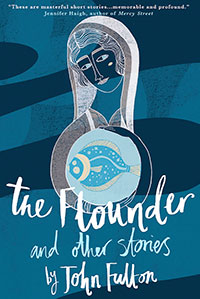 *
*
Book Review by Off the Shelf Correspondent Ed Meek
Some of the best fiction in the past one hundred years or so has come in the form of short stories: Hemingway, Fitzgerald, Raymond Carver, Flannery O’Connor, Alice Munroe, Tobias Wolf, etc. Short stories have some advantages over novels. They can zero in on a particular time period or a conflict or a problem and they can usually provide the reader with a sense of an ending where the endings of novels can be unsatisfactory. Recently there’s been a trend toward micro-fiction, but a well-developed short story creates its own little world of escape and contemplation. And despite the availability of so many other ways to entertain ourselves, Fiction still offers insight into the inner lives of characters in a way that is deeper and more satisfying than film and television to give us a portrait of our lives today.

The Flounder and Other Stories
By John Fulton
Blackwater Press, West Virginia,168 pages. $18.99.
John Fulton is already an accomplished writer with a novel and two short story collections published. He’s won a Pushcart Prize and appeared in Best American Stories. Fulton has a feel for the uncertainty of our age. In The Flounder, his characters are awkward with each other. They grapple with how to love one another and how to deal with childhood pain from fathers that walked out and mothers who were left fearful and sad. They may have grown up religious, and although they no longer are, they still struggle with what they believe in.
His stories jump right into conflict. A store owner is being held up at gun point and telling the robber to go ahead and shoot him, he’s dying anyway. A young wife confesses to her husband that she slept with someone else just before they leave for a vacation together. Fulton grew up in Montana and lived in Europe for a number of years and he is able to write with authority about both settings and give us an insider’s perspective on the American West and on places like Switzerland and Budapest.
The western writer Bill Kittredge says that in order for fiction to be effective, the writer, like a juggler, has to keep a number of story strands up in the air at once. In the best stories in The Flounder Fulton does just that. In Nocturne, a young couple, Miriam and Daniel, who fight a lot, comically have to fight in whispers when they rent rooms from an older Swiss woman because the Swiss do not want to be disturbed, ever. Because the older woman sees them as a happy young couple, they are forced to act as if it is true. Miriam reads Daniel’s journal and discovers he is critical of her. He’s indignant because she invaded his privacy. No one in Fulton’s stories is completely honest or forthright with a partner. Instead, they engage in power struggles while talking around things. Fulton is very good at capturing the nuances of our thoughts and relationships. The title refers to the piece by Chopin and the hostess, one night, plays it beautifully and the music seems to draw the couple back together. In this story and others, Fulton is able to delve into the sex his characters engage in in a way that is completely convincing. Here he pairs the sex with the music. The complexity makes for a great short story. Three other stories in the collection are just as good.
Writers of short stories, like poets, can use the form as a means of experimentation, a kind of how about this? So, collections of short stories are always somewhat uneven. Fulton occasionally violates Chekhov’s dictum about firing the gun by the third act. Two stories are sentimental tales of cold fathers and sad sons. One story is all telling and no showing. But, in a short story collection as in a book of poems, we have to judge the author by his best work. For that reason, The Flounder is well worth reading.















Reader Comments